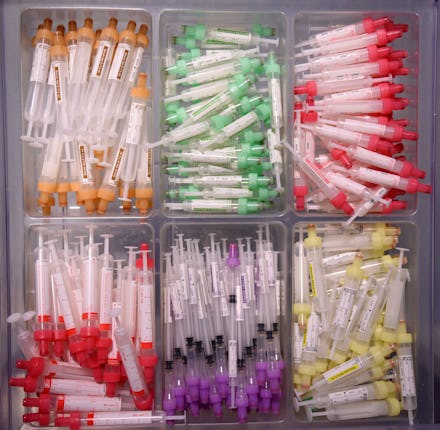Here Are the Questions You Must Ask at Your Next STD Test

When getting screened for sexually transmitted infections, it's natural to feel squeamish about asking for information. But doing so is necessary, because that's the only way you're guaranteed to get all your problems solved and to have safer sex going forward. If you're not automatically told, these are the questions you must ask at your next STI test.
Read more: STD Testing: Here Are the Services Planned Parenthood Has to Offer
And remember, there's a good chance the doctor has seen whatever may be ailing you too many times to count. They're professionals. Their job is to help you and you should let them do that job. STIs don't always show symptoms, but can be seriously dangerous to your health — and many people have them.
What are you testing for? It's prudent to know what you may or may not be passing to partners. Your doctor can help you assess what you need to test for, but common afflictions include HIV, chlamydia, gonorrhea, hepatitis, syphilis and trichomoniasis.
A yeast infection is not a sexually transmitted disease, but a medical professional can determine whether those symptoms do in fact stem from candida overload, or are caused by another pH imbalance-related complaint, bacterial vaginosis.
Anyone with a uterine cervix should be getting routine cervical cancer screenings, because a Pap test can reveal the presence of human papillomavirus, which can result in cervical cancer or genital warts.
Why doesn't that include herpes? One of the more conspicuous of the STIs is also conspicuously absent from the above list: herpes. There are two forms of herpes and a whole lot of haziness surrounding diagnosis, which is why many doctors won't automatically test for it and why the Centers for Disease Control and Prevention doesn't recommend it for people who don't show symptoms. Anyone who's concerned should ask specifically to be tested for herpes.
What's the incubation period for an STD? The answer varies with the STI. According to STDCheck.com, it's one to five days for chlamydia, two to six days for gonorrhea, three to six weeks for syphilis, two to seven weeks for hepatitis A, six weeks for hepatitis B, eight to nine weeks with hepatitis C, four to six weeks for both genital and oral herpes, one to three months for HIV antibodies and nine to 11 days for HIV RNA testing. Anything you maybe caught from unprotected sex on Saturday won't necessarily be detectable by Monday.
How do I notify past partners? This part's going to be uncomfortable, but notification is a must. You can do it yourself, or you can have an anonymous service do it, but either way, past partners should know about your diagnosis immediately, lest they spread it to others. STDCheck.com will do it with a text message. So They Can Know will do it with an email. Your doctor should be able to help you sort out who and how to tell.
When do I need to come in for my next screening? That depends on you — if you've had unprotected sex, if you have a new partner, if you or your partner has been unfaithful, if your partner has an STI or if you're worried. As a rule, once a year is advisable.